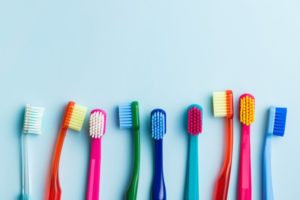
A major part of keeping a whole and healthy smile is brushing your teeth twice a day. It wards off cavity-causing bacteria, as well as protects your gums from inflammation. Since it is such a common part of your daily dental routine since you were young, it can be easy to think that all toothbrushes are created equal. In reality, there are many important differences in how brushes are designed that can make them more or less suited for caring for your pearly whites. Read on to learn about four important factors when choosing a toothbrush that is best for you.
#1. Which is Best: Electric or Manual?
The debate about which toothbrush—electric or manual—is best for your health has been heavily discussed over the years. While it has been proven that both options have their advantages, recent research has shown that electric alternatives provide a superior cleaning ability. They remove plaque and prevent gingivitis at a higher rate than their counterpart. However, if you are going to make the switch, be sure to talk to your dentist so they can guide you to the best one for your smile.
#2. Varying Sizes of Toothbrush Bristles
In the past, most bristles were all the same size on the toothbrush. However, now more and more manufacturers are designing their toothbrush heads to have many different-sized bristles. The variation can make it easier to get into the deeper gaps between your teeth, allowing for a more complete cleaning.
#3. Different Head Shapes
When browsing the options of toothbrushes at the store, you may not be considering how the shape of the head can affect your oral health. Conventional and diamond-shaped options are both able to remove food particles, plaque, and debris. However, the narrower tips of the diamond-shaped toothbrushes can reach the back and sides of your molars more effectively. These hard-to-reach areas have the highest likelihood of developing decay and cavities so be sure to consider a head shape that can effectively clean them.
#4. Soft-Bristles Are the Way to Go
There are three different choices in bristle strength: soft, medium, and hard. While it’s natural to think a hard-bristled toothbrush is the best choice for a more thorough cleaning, it actually is not. The American Dental Association recommends only soft-bristled brushes. They have been clinically proven to effectively remove plaque and food particles without causing damage to your teeth or gums.
You want to take great care of your pearly white so they can last for years to come. By picking the right toothbrush and using it consistently, you are on the right path to keeping your smile whole and healthy for as long as possible!
About the Author
Dr. Nelson Y. Howard is eager to help you keep your smile in its best condition throughout your entire lifetime. With over 35 years of experience, he offers comprehensive dental care for any of your oral health needs. He provides a full range of services, including preventive, restorative, cosmetic, and emergency dentistry. To schedule an appointment, contact him through his website or call (760) 599-6559.
